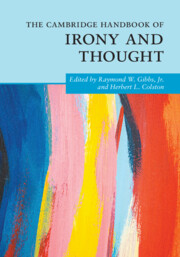Book contents
- The Cambridge Handbook of Irony and Thought
- Cambridge Handbooks in Psychology
- The Cambridge Handbook of Irony and Thought
- Copyright page
- Contents
- Contributors
- Part I Introduction
- Part II The Scope of Irony
- Part III Irony’s Impact
- Part IV Irony in Linguistic Communication
- Part V Irony, Affect, and Related Figures
- 14 Irony and Humor
- 15 Emotional Responses to Sarcasm
- 16 Irony, Exaggeration, and Hyperbole: No Embargo on the Cargo!
- 17 Irony and Its Overlap with Hyperbole and Understatement
- 18 Irony and Satire
- 19 Hypocrisy and Situational Irony
- Part VI Irony in Expressive, Nonlinguistic Media
- Index
- References
14 - Irony and Humor
from Part V - Irony, Affect, and Related Figures
Published online by Cambridge University Press: 20 December 2023
- The Cambridge Handbook of Irony and Thought
- Cambridge Handbooks in Psychology
- The Cambridge Handbook of Irony and Thought
- Copyright page
- Contents
- Contributors
- Part I Introduction
- Part II The Scope of Irony
- Part III Irony’s Impact
- Part IV Irony in Linguistic Communication
- Part V Irony, Affect, and Related Figures
- 14 Irony and Humor
- 15 Emotional Responses to Sarcasm
- 16 Irony, Exaggeration, and Hyperbole: No Embargo on the Cargo!
- 17 Irony and Its Overlap with Hyperbole and Understatement
- 18 Irony and Satire
- 19 Hypocrisy and Situational Irony
- Part VI Irony in Expressive, Nonlinguistic Media
- Index
- References
Summary
This chapter examines the complicated relationship between irony and humor, primarily from the perspective of neo-Gricean pragmatics (e.g., an ironic utterance flouts/overtly violates the maxim of Quality). Not all irony is humorous, of course, in part because of the highly polysemous nature of irony. In this light, it is important to distinguish irony that is humorous from irony that is related to sarcasm, teasing, parody, and even playfulness. Dynel offers a formal test by which one may determine what forms of humor may be specifically viewed as “irony.” She also describes some of the reasons why irony sometimes expresses humor, focusing on the importance of contrast and incongruity in judgments of ironic humor, but extending this emphasis to include surprise, absurdity, and creativity as key facets of humorous irony. Even blindness to irony can elicit humorous responses in some interpersonal situations. Dynel’s chapter also considers some of the intricacies in the ways speakers use humorous irony to position themselves in various interactions with others.
- Type
- Chapter
- Information
- The Cambridge Handbook of Irony and Thought , pp. 237 - 254Publisher: Cambridge University PressPrint publication year: 2023
References
- 2
- Cited by

